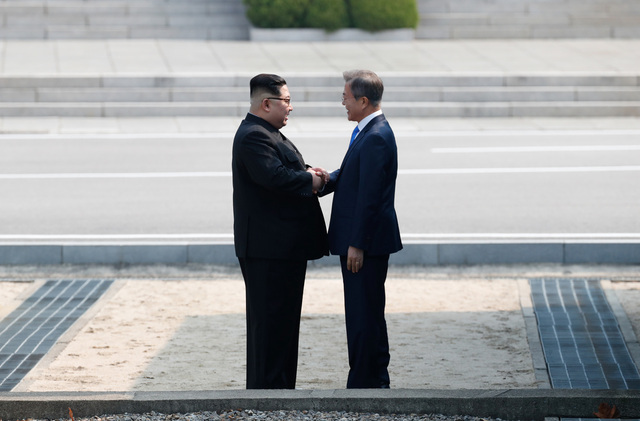 |
|
South Korean President Moon Jae-in shakes hands with North Korean leader Kim Jong-un on the North Korean side of the Military Demarcation Line (MDL) in Panmunjeom before the 2018 Inter-Korean Summit on Apr. 27. (photo pool)
|
Peace treaty to be signed by three parties and China
The Blue House said it does not regard China’s participation as being absolutely necessary for its plan to declare the end of the Korean War this year. Even so, it emphasized that China has a major role to play in a peace treaty. The apparent plan for the Korean Peninsula peace process is for the declaration of the end of the war, which is of political significance, to be made by South Korea, North Korea and the US, and for the peace treaty, which is an institutional development, to be signed by those three parties along with China. “Declaring the end of the war is a political declaration about resolving hostile relationships, and it’s worth thinking about whether China needs to be a party to that,” a senior official at the Blue House said in a meeting with reporters on May 2. While China is a belligerent in the Korean War, in other words, it is necessary to consider that China has already resolved its own hostile relationships by establishing diplomatic relations not only with South and North Korea but also with the US. “But a peace treaty means the creation of a legal and institutional instrument, and China would have quite a large role to play since this is not just a matter for South and North Korea or for North Korea and the US,” the official added. The implication is that China’s participation is a necessary condition for making a peace treaty. By clarifying which parties will be involved in declaring the end of the war and signing a peace treaty, the Blue House is apparently seeking to accelerate the timeframe for building a peace regime on the Korean Peninsula in accordance with the Panmunjeom Declaration released on Apr. 27. The Panmunjeom Declaration said that “During this year that marks the 65th anniversary of the Armistice, South and North Korea agreed to actively pursue trilateral meetings involving the two Koreas and the United States, or quadrilateral meetings involving the two Koreas, the United States and China with a view to declaring an end to the war [converting the armistice to a peace treaty] and establishing a permanent and solid peace regime.” Stating that the parties involved in declaring the end of the war may be limited to South Korea, North Korea and the US is designed to resolve the ambiguity in the previous discussion. Presumably, this is supposed to preclude time-consuming arguments about who will take part in the declaration. At the same time, the Blue House said it was not excluding China from participating in the declaration of the end of the war. In other words, the way is open for China to participate if it so chooses, though its participation is not absolutely necessary. “To be sure, there is certainly room at the table for China. If China indicates that it wants to join, we would have no particular reason to decline,” a senior official at the Blue House said. “There’s language in the Panmunjeom Declaration about three or four parties. There’s no presumption or conclusion that China will be prevented from being a party to the declaration of the end of the war if it says it means to do so,” a senior official at the Unification Ministry said during a meeting with reporters on May 2. China will likely decide whether to take part in declaring the end of the war after Chinese State Councilor and Foreign Minister Wang Yi, who is currently visiting Pyongyang, gauges North Korea’s position on the matter. The debate about China’s participation in discussing the declaration of the end of the war and the peace treaty also came up during the preparations for the Oct. 4 Declaration in the 2007 inter-Korean summit. China was consulted about this question at the time, but it did not give a definite answer until after the inter-Korean summit, at which point it expressed its determination to be one of the participating parties. By Seong Yeon-cheol and Noh Ji-won, staff reporters Please direct comments or questions to [english@hani.co.kr]






